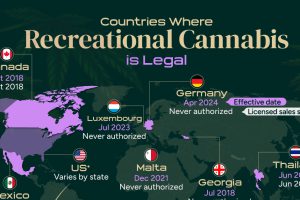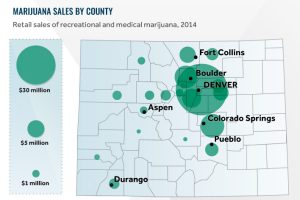Mapped: The European CBD Landscape in 2020
To say CBD has risen in popularity over the last decade is an understatement.
Not only have CBD consumer products rapidly infiltrated a long list of industries, new research discoveries continue to prove their therapeutic benefits. By 2023, the European CBD market is estimated to reach €1.4 billion.
However, a big problem remains—there is an incredible amount of uncertainty surrounding what is legal, and what isn’t. The above infographic from Elements of Green sheds some light on the innately complex legal status of CBD products in Europe.
The Great CBD Debate
CBD—short for cannabidiol—is a non-psychotropic compound produced by cannabis plants.
While most European countries have legalised it in some way, the caveat for many is that it must be extracted from industrial hemp, thus containing less than 0.2% THC—the intoxicating compound also found in cannabis. On the other hand, countries such as France and Norway only permit CBD isolate (the pure form of CBD) with no THC.
In 2019, the European Food Safety Authority (EFSA) designated CBD products as a novel food. This means that companies should seek authorisation to bring products to market, although it is not required by law.
However, the industry has now hit a fork in the road, as the European Commission (EC) recently announced it will be suspending applications for novel foods status while it determines whether or not certain CBD products should be labelled as narcotics instead.
The Legal Landscape in 2020
As the industry flip flops between regulations, consumers and investors need to understand that each country has its own laws surrounding the use of CBD.
| Country | CBD Legal Staus |
|---|---|
| 🇦🇱 Albania | Illegal |
| 🇦🇩 Andorra | Illegal |
| 🇦🇲 Armenia | Illegal |
| 🇦🇹 Austria | Legal grey area (legal lean) |
| 🇧🇾 Belarus | Illegal |
| 🇧🇦 Bosnia and Herzegovina | Illegal |
| 🇧🇪 Belgium | Legal grey area (restricted lean) |
| 🇧🇬 Bulgaria | Unrestricted |
| 🇨🇿 Czech Republic | Legal grey area (legal lean) |
| 🇭🇷 Croatia | Legal grey area (legal lean) |
| 🇩🇰 Denmark | Unrestricted |
| 🇪🇪 Estonia | Legal grey area (legal lean) |
| 🇫🇮 Finland | Legal grey area (restricted lean) |
| 🇫🇷 France | Unrestricted |
| 🇬🇪 Georgia | Illegal |
| 🇩🇪 Germany | Unrestricted |
| 🇬🇷 Greece | Unrestricted |
| 🇭🇺 Hungary | Legal grey area (legal lean) |
| 🇮🇸 Iceland | Legal grey area (legal lean) |
| 🇮🇪 Ireland | Legal grey area (restricted lean) |
| 🇮🇹 Italy | Legal grey area (restricted lean/legal for medical use) |
| 🇱🇻 Latvia | Legal grey area |
| 🇱🇮Liechtenstein | Legal grey area |
| 🇱🇹 Lithuania | Illegal |
| 🇱🇺 Luxembourg | Unrestricted |
| 🇲🇹 Malta | Legal grey area/legal for medical use |
| 🇲🇩 Moldova | Illegal |
| 🇲🇨 Monaco | Illegal |
| 🇲🇪 Montenegro | Illegal |
| 🇳🇱 Netherlands | Unrestricted |
| 🇲🇰 North Macedonia | Legal for medical use |
| 🇳🇴 Norway | Legal for medical use |
| 🇵🇱 Poland | Unrestricted |
| 🇵🇹 Portugal | Legal for medical use |
| 🇷🇴 Romania | Unrestricted |
| 🇷🇸 Serbia | Legal grey area (restricted lean) |
| 🇸🇰 Slovakia | Illegal |
| 🇸🇮 Slovenia | Unrestricted |
| 🇪🇸 Spain | Unrestricted |
| 🇸🇪 Sweden | Unrestricted |
| 🇨🇭 Switzerland | Unrestricted |
| 🇺🇦 Ukraine | Unrestricted |
| 🇬🇧 United Kingdom | Unrestricted |
While a handful of European countries have made it illegal to import, buy, or possess CBD, the vast majority have legalised CBD products that either comply with the Novel Foods Act, or can be obtained from a licensed medical practitioner.
Of these countries, Germany and the UK lead the European CBD market, followed by Switzerland, Austria, Spain, and Greece.
A Call For Change
A progessive stance on cannabis legalisation combined with increasing consumer demand has led to several countries showing remarkable growth, such as Poland, Bulgaria, Netherlands, and Luxembourg.
Luxembourg in particular presents a compelling growth story, as it plans to fully legalise adult-use recreational cannabis in 2021, which would make it the first European country to do so.
Despite its small size, Luxembourg could in fact be instrumental in encouraging neighbouring countries to implement similar reforms, also known as the neighbour effect.
Growing Pains of a Nascent Industry
Considering each country has its own unique restrictions in place, CBD consumers should educate themselves on the regulations and laws relevant to them.
Despite these often confusing laws and restrictions, it is clear that demand for CBD products is growing exponentially. As a result, the continent may have the potential to overtake North America as the largest CBD market in the world.





